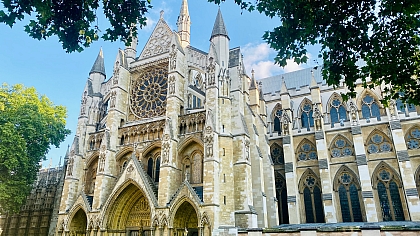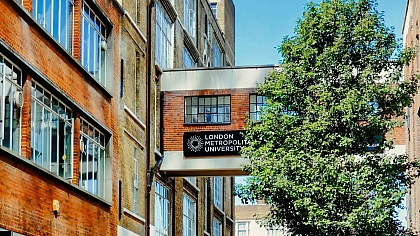4 Tips From London’s Best SEO Experts
When exploring London's vast digital landscape, ensuring your business ranks high on search engines is crucial for success. Google, the undisputed leader in search engines, is the go-to tool for both locals and tourists searching for anything from iconic attractions to local services like restaurants or plumbers.
For London-based businesses looking to attract more visitors, mastering SEO (Search Engine Optimization) is key to standing out in a competitive market.
High-quality content, relevant keywords, and thoughtful user experience are essential for ranking well, especially in a bustling city where online visibility translates directly into foot traffic and revenue. As you navigate London's rich history and cultural spots, it's equally important to optimize your digital presence to keep pace with the city's ever-evolving business landscape. By ensuring your website is optimized for both search engines and real visitors, you'll be better equipped to capture the attention of London's diverse audience.
Ask anyone unfamiliar with ranking local websites in London to name a search engine other than Google, and they’ll likely hesitate to think of one they use often. Unless, of course, they’re particularly privacy-conscious—then they might quickly list a few alternatives.

They have come as far as to have Google becoming a verb that we use every day to search for things online. It’s a pretty significant leap for a company to have its name turn into a verb.
So it’s no surprise that Google is the King when it comes to search engines. Everyone wants to have their website rank for specific keywords. And who wouldn’t?
Businesses that rank well for specific keywords are proven to do better in terms of revenue compared to businesses that don’t focus on SEO as an overall digital marketing strategy.
So, it makes sense for you to listen to what the experts at Google say and also the SEO experts who are in the trenches every day working to rank their websites on the first page. And if you think that reading through hundreds of articles to learn how Google’s algorithm works and do the SEO yourself is too much because you are already putting 40 hours of work in, you can always contact the experts and they’ll take care of you.
So, what are the most straightforward ways you can rank your local business website on the first page of Google?
Content Is Everything
A lot of people like to disagree with the experts that come on Google Webmaster's YouTube channel. But there’s just no way around this.
Google wants people to provide high-quality information to the readers of the internet. And they have gotten pretty good at spotting a high-quality article than a low-quality article.
A lot of people who work with offshore companies (specifically the countries that don’t have English as their native language) know what I’m talking about. You just can’t understand what they are trying to say. The sentence structures are all messed up. And half the time it doesn’t even make sense.
Google can easily spot that.
Gone were the days when Google would just look at how many times you were repeating a certain keyword on your page and would rank you based on that.
But now their algorithm has gotten pretty smart at detecting low-quality content.
And it will hurt the SEO of your website in the long run.
So What Should I Do? I Don’t Have Thousands of Dollars Just to Spend On Articles?
If you are on a tight budget, the best thing you can do is write the articles yourself. Because this is something you cannot cut corners on. Think of your articles as an investment. You will be putting in time and energy to write something that people will read and hopefully buy whatever you’re selling.
You won’t see the sales come in immediately but once your website is ranking on the first page, it will be a LOT easier if your content is good and people enjoy reading it.
And if you were able to rank with low-quality content (and that’s a HUGE if), your visitors won’t buy anything from you because your articles just don’t make any sense.
And they will notice that since you haven’t bothered to put much effort into writing good quality content for your website, how will you deliver value to them?
Optimize For the People
When people start with SEO, they forget that they are going through all these hoops just to get in front of other people. They start focusing on the machine aspect of this and optimize their websites just for the machines.
You shouldn’t do that. You want to take a step back and think about what the end-users will experience when they visit your website.
Sure, you do have to go through a lot of numbers and keywords. Make sure that your website has your target keywords in the right places. But it should all flow naturally. And it should make sense to the end user.
Whether that means having a great design or just writing great articles. That depends on what you are trying to do with your website.
You can test this out by asking your friends and family to go through your website and give you suggestions on what you should improve.
Striking a Perfect Balance With On-Page Optimization
For SEO beginners, On-Page Optimization means making changes on your website and having all the keywords in the most important places. This will help the search engines determine what your page is about. Essentially, you are making it easier for them to put your website in a box and see whether it is more relevant than the websites that are already ranking on the first page for that keyword.
So what are these important places you say?
There are 5 places where you have to have your keywords:
- Domain OR URL
- Title tag
- H tags
- Meta description
- In the content
If you don’t already have your keywords in all these places, just add them in there and I guarantee that your website will jump up a couple of spots for the keywords you are targeting.
So how do I strike a perfect balance with this?
That’s where the art comes in. When I said that you need to have your keywords in those 5 places, 99% of the people would just copy and paste their keywords in there and expect to rank.
That’s now how you are supposed to do.
Let’s use an example. Let’s say you are a plumber in London and you are trying to rank your website for the keyword “best plumber in London”.
Do you think it would look natural for a person to go to your website and see you repeat that keyword 10-15 times?
It would look unnatural because nobody talks like this:
“If you are looking for the best plumber in London, you need to make sure that you give us a call because we are the best plumber in London.”
Who talks like that? Nobody.
That’s why you want to make sure that it looks natural. You should be doing something like this:
If you are looking for the best plumber in London, give us a call. We have over 100 reviews from our fellow Londoners who loved our services in the past and we guarantee that you’ll love our service as well.”
That looks a lot more natural and we also managed to get our keyword in there.
See, it’s not about repeating the keywords over and over. It’s about including them on your website in a way that makes sense for the reader while also making sense for the search engines.
Off-Page Optimization Is Where You’ll Spend Most of Your Time
Off-page optimization is all about getting backlinks from other relevant websites.
Let’s take the plumber example from above.
It doesn’t make sense for his website to receive backlinks from a website that talks about pets or baby products, does it?
But if a website that talks about home improvement is linking out to our plumber website, then it makes a lot more sense. But if another plumbing website links to our plumbing website, that is SUPER relevant.
That’s what you are looking to do with off-page optimization – you want to get as many relevant links to your website as possible. And you also want to make sure that you are not getting all of them at once. Spread them out over a long period and see how your website starts climbing the search engine results page.
This is where you will be spending most of your time. Because after you get 1 link, you will be searching for another one and then another one and on and on…
I find this part fun because it’s like a treasure hunt. You never know when and where you will find that link but you know that if you put on your investigator hat and keep going at it, you will find more and more websites.












